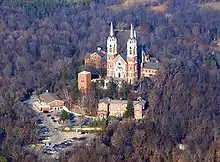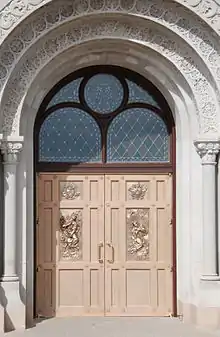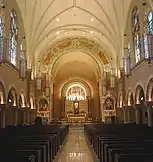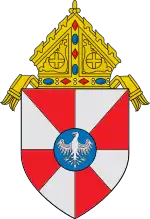Holy Hill National Shrine of Mary, Help of Christians
Holy Hill Basilica and National Shrine of Mary Help of Christians is a Roman Catholic shrine in the north central United States, dedicated to the Blessed Virgin Mary. The centerpiece of the shrine is a minor basilica. It is located in the town of Erin, near Hubertus, Wisconsin, in the Roman Catholic Archdiocese of Milwaukee. The shrine has approximately 300,000 visitors per year.[2]
Holy Hill | |
 Holy Hill Basilica | |
  | |
| Location | 1525 Carmel Rd., Erin, Wisconsin |
|---|---|
| Coordinates | 43°14′42″N 88°19′38″W |
| Area | 21 acres (8.5 ha) |
| Architect | Hermann J. Gaul, Richard Philipp |
| Architectural style | Romanesque Revival |
| NRHP reference No. | 92000139[1] |
| Added to NRHP | March 12, 1992 |

Location
The shrine is located atop a high kame in 400 acres (1.6 km2) of woods. Visitors can climb a 178-step observation tower to view the Milwaukee skyline, about thirty miles (50 km) southeast.[3] At approximately 1,350 feet (410 m) above sea level, it is one of the highest points in southeastern Wisconsin.
Near Wisconsin's Ice Age Trail, it is about four miles (6.5 km) east of Erin Hills, a championship golf course which hosted the U.S. Open in 2017.
History
Tradition says that the hill was first discovered 348 years ago in 1673 by Father Jacques Marquette with Louis Jolliet.[4] However, modern historians view this tradition as untrue, though Jesuits were likely the first Catholic priests to discover the hill.
The U.S. government owned the land until 1855,[5] and the hill was known as "Government Hill" because surveying work was done there. Forty acres were purchased by Fr. Paulhuber of Salzburg, Austria.[5]
The first resident on the hill was a hermit named François Soubrio.[6] Around 1862, an area farmer found him living on the hill. Soubrio had heard about the hill when he was working as an assistant to a retired professor in Quebec, Canada. He had found an old French diary and map dated 1676 showing a cone-shaped mountain in Wisconsin. The diary described how the author placed a stone altar, raised a cross, and dedicated the hill to Jesus's mother Mary. The diary account corresponds with Jesuit missionary work in the area between 1673 and 1679.[5]
The name "Holy Hill" was first given to the place by Irish settlers in the area.[6] Father George Strickner dedicated a log chapel as the first Shrine of Mary, Help of Christians on May 24, 1863.[7] A set of wooden crosses were placed for the Stations of the Cross in 1875. In the winter of 1879, Fr. Raess sent a proposal to Archbishop John Henni to construct a new shrine to Mary. Construction began that spring. Pilgrims began flocking to the shrine, and it was decided that a religious order should administer the shrine. A group of Discalced Carmelites came from Bavaria at the invitation of Archbishop Sebastian Messmer, and the Shrine of Mary was put under their care on June 26, 1906.[8] The building now known as the Old Monastery Inn and Retreat Center was completed in 1920. The second shrine was removed in 1925 so that a third shrine could be built. The cornerstone of the third and present shrine was placed by Archbishop Messmer on August 22, 1926.[5] The present church was completed and consecrated in 1931.[5]
Another tradition describes a German priest who was recreant to his vows and came to America for penance. He found a reference to the hill in Marquette's diary and decided to take a pilgrimage. He became ill in Chicago, and was paralyzed. He reportedly found the hill, crawled to the summit on his hands, and was cured of his paralysis.[4]
Worship site
The basilica hosts weekend Masses. There are also daily religious services and Marian devotions.
The main church was built in 1930.[2] At its entrance, It has two eight-foot-tall statues which were placed there in 1958. The statue on the left depicts St. Mary, Help of Christians; and the one on the right depicts Saint Joseph, protector of the Carmelites. The inside of the church features mosaics of Discalced Carmelite founders St. Teresa of Jesus and St. John of the Cross.
Repairs
The church underwent a $6.1-million renovation between 2002 and 2006.[2] The renovations included extensive interior decorative painting, faux stone & mosaic by Conrad Schmitt Studios [9][10] and exterior repairs, including a new slate roof for the monastery, main church and bell tower.[2]
On June 6, 2006 (06/06/06), vandals spray-painted the church and several shrines with expletives and references to Satan and the Number of the Beast.[2] It was later discovered the vandals were two teenage boys.[7] The cost of removing the graffiti was in excess of $33,000.
On May 26, 2013, four new cast-bronze entry doors were dedicated by His Excellency, Archbishop Jerome E. Listecki. The doors were designed by architect Duncan G. Stroik and contain scenes sculpted by artist Cody Swanson. The scenes depict Saint Theresa of Ávila, The Annunciation with Gabriel the Archangel and Our Lady, and Saint John of the Cross.

 Interior prior to the restoration
Interior prior to the restoration Restored Interior
Restored Interior Restored Sanctuary
Restored Sanctuary
Milestones
The shrine is listed on the National Register of Historic Places. On July 16, 2006, a Mass was held celebrating 100 years of Carmelite stewardship at the site. During that Mass it was announced that Pope Benedict XVI had named Holy Hill a minor basilica.[11] Holy Hill was dedicated as a minor basilica by Archbishop Timothy Dolan on November 19, 2006. There are about 85 minor basilicas in the United States.[12][13]
New York Cardinal Timothy Dolan drew a large crowd of Catholics and well-wishers to Holy Hill on April 28, 2012, for a special Mass of Thanksgiving, some arriving as early as 4:30 a.m. to ensure a spot in the historic Basilica of the National Shrine of Mary Help of Christians.
Climate
| ||||||||||||||||||||||||||||||||||||||||||||||||||||||||||||||||||||||||||||||||||||||||||||||||||||||||||||||||||||||||||||
See also
References
- "National Register Information System". National Register of Historic Places. National Park Service. March 13, 2009.
- Behm, Don (June 7, 2006). "Vandals desecrate grounds of Holy Hill on 6-6-'06". Milwaukee Journal Sentinel. Archived from the original on 2007-08-15. Retrieved 2007-06-19.
- Tarnoff, Andy (January 2, 2001). "Holy Hill makes for festive day trip in winter or summer". On Milwaukee. Retrieved 2007-06-19.
- "Term: Holy Hill". Wisconsin Historical Society. Retrieved 2007-06-19.
- "Holy Hill Shrine, Wisconsin". Sacred Destinations. Archived from the original on 2007-10-17. Retrieved 2007-06-19.
- "History of the Basilica", Holy Hill
- Kertschner, Tom (June 10, 2006). "Cousins charged with felonies in Holy Hill vandalism: Authorities say elder of 2 expressed no remorse". Milwaukee Journal Sentinel. Archived from the original on September 24, 2015. Retrieved 2007-06-19.
- ""The Province of the Immaculate Heart of Mary in the United States", Discalced Carmelite Friars". Archived from the original on 2014-03-05. Retrieved 2014-03-05.
- Restoration of Holy Hill National Shrine of Mary, Help of Christians.; Published in "Sacred Places" magazine - Summer 2005
- Restoration of the Basilica of Holy Hill, National Shrine of Mary, Help of Christians, Hubertus, WI - Published in "Exclusively Yours" magazine
- Griesbach, Gay (July 17, 2006). "Papal blessing: Holy Hill upgraded to minor basilica". West Bend Daily News. Archived from the original on September 28, 2007. Retrieved 2007-06-19.
- "Discalced Carmelite Friars, Washington Province". Archived from the original on 2013-04-15. Retrieved 2013-01-28.
- "Basilicas in USA". www.gcatholic.org. Retrieved 2018-07-23.
- "NASA Earth Observations Data Set Index". NASA. Retrieved 30 January 2016.
Further reading
- Kearns, Mary. Holy Hill: Its History. Discalced Carmelite Fathers, 1987.
External links
| Wikimedia Commons has media related to Holy Hill National Shrine of Mary, Help of Christians. |
